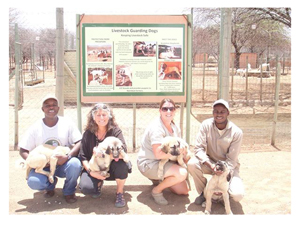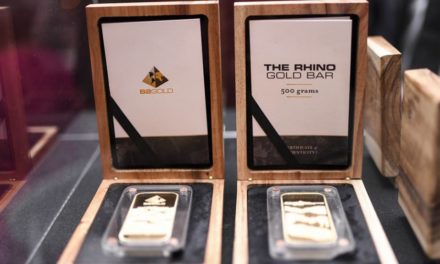
Cheetah fund sends Kangal dogs to Tanzania

RCP’s Ayoub Msago (left) with Dr. Laurie Marker (centre left), along with Livestock Guarding Dog Programme Manager Ana Bradley (center right) and Small Stock Manager, Tyapo Toivo (right). The dogs they hold are on their way to Tanzania to become the nucleus of a breeding programme for guard dogs to protect livestock from predators.
The dogs arrived on 8 November at the Ruaha Carnivore Project and are from the CCF’s Livestock Guard Dog programme.
With the arrival of these dogs, CCF will share this highly effective predator-friendly control technique with livestock herders in Tanzania.
The four dogs, two male and two female, are Kangals, a breed famous in its native Turkey for guarding small livestock herds against wolves and bears for thousands of years .
The pups were born on 18 of August 2013 to CCF’s, Aleya, sired by Firat, both purebred Kangals, and have been spayed and neutered.
CCF’s Livestock Guarding Dog programme has been placing dogs with Namibian farmers since 1994. Since then, CCF has placed over 450 dogs.
The livestock guard dogs bond with their herds, and are highly effective at deterring predators.
Their loud and ferocious bark deters predators, and farmers using a CCF dog see their predation rates from all predators reduced by 80 to 100%.
Because the farmers feel more secure in their livelihoods, they are less likely to do harm to cheetahs and other predators.
The dogs are being sent to the Ruaha Carnivore Project (RCP) in Tanzania, which is run by Dr. Amy Dickman.
RCP is part of Oxford University’s Wildlife Conservation Research Unit (WildCRU), where CCF Founder and Executive Director Dr. Marker conducted her doctoral research.
Dr. Dickman spent six years in Namibia working with Dr. Marker in the Livestock Guard Dog programme, and has published several research papers documenting the effectiveness of the dogs.
The RCP works to develop conservation strategies for large carnivores in the important Ruaha Landscape.
The new dogs will be placed with farmers from the Maasai and Barabaig tribes.
Dr Marker said “We’ve been developing programmes in Namibia to save predators for nearly 25 years working from here to help other cheetahs in other of its range countries.
Our research shows that solutions like the dogs are very effective. Every time we help start a new programme in another country, we’re thrilled, because we know we’re making real progress in the race to save the cheetah, and all predators.”
Mr. Ayoub Msago, RCP’s Community Liaison Officer has spent two weeks at CCF in Namibia to learn about the Livestock Guard Dog programme.
He traveled over 1300km around Namibia with CCF’s staff, visiting working dogs on Namibian farms, learning how the dogs are trained, and how CCF’s Livestock Guard Dog programme is managed.
In Tanzania, goats from neighboring farms will be brought to a specially prepared kraal in the RCP research area and will be introduced to their new owners under Dr. Dickman’s supervision.










































